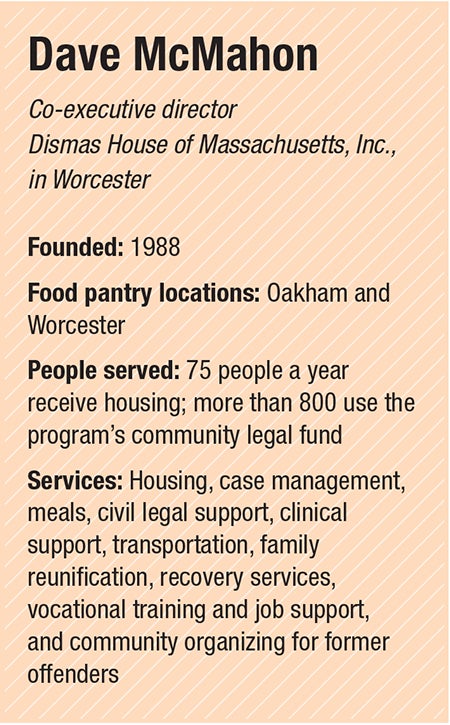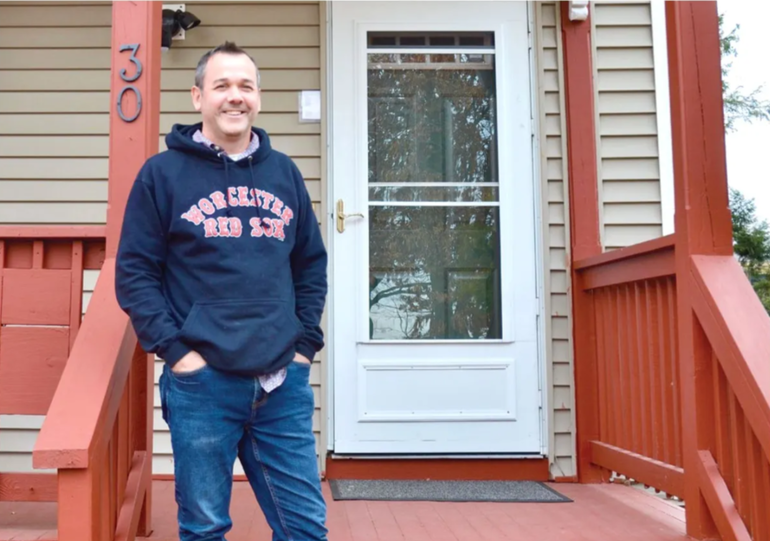Dismas House of Massachusetts, Inc. is a nonprofit organization in Greater Worcester helping former prisoners in the area find housing, work, and other reentry needs as they try to piece their lives back together.
Get Instant Access to This Article
Subscribe to Worcester Business Journal and get immediate access to all of our subscriber-only content and much more.
- Critical Central Massachusetts business news updated daily.
- Immediate access to all subscriber-only content on our website.
- Bi-weekly print or digital editions of our award-winning publication.
- Special bonus issues like the WBJ Book of Lists.
- Exclusive ticket prize draws for our in-person events.
Click here to purchase a paywall bypass link for this article.
Dismas House of Massachusetts, Inc. is a nonprofit organization in Greater Worcester helping former prisoners in the area find housing, work, and other reentry needs as they try to piece their lives back together. The nonprofit’s family-style approach helps former inmates find a place to live and work and provides them with counselors and other support systems to get them reacclimated while trying to help lift the stigma associated with people who were previously incarcerated. With three houses in Worcester and Dismas Family Farm, a 35-acre residential program, Dismas has been providing its services for more than 30 years.

How does a nonprofit operate in this climate?
It has been an interesting time with COVID, in particular. Everyone went on emergency footing, thinking the economy was going to collapse, and it briefly did for a few months. The philanthropic community then responded and continues its support to this day, so you see all kinds of funding and recognition of the need in the community, whether it is for homelessness, food insecurity, or other challenges.
Worcester has a lot of housing challenges. The economy rebounded briefly, and Worcester has a very strong group of foundation support for organizations such as ours. You combine that with some of the new funding from the Biden Administration filtering through the state, and that allows us to expand and try to do some new things around hunger initiatives, housing, and things like that.
It has been an interesting change in the landscape from emergency footing to the ability to look at doing new projects.
What kind of new projects are you looking at?
We're new in the food insecurity area. One of our programs is a residential farm program in Oakham. We have people who have been homeless coming out of hospitalization or out of prisons, and they live there. They work with our farm steward, growing food.
For many years, we would do farmers markets. We actually ran one in Westborough. We would do our own CSA where we would try to sell everything, but we developed some partnerships through the years with Jeremiah's Inn food pantry, Worcester Common Ground Inc., and a few other partners. We found it's more fulfilling to distribute the food we grow and incorporate that into the food pantries in Worcester. That hunger program has been slowly growing over time, and we hope to convert almost all of our growing for that effort now.
You're also combatting homelessness. How do you fund that and find housing for people?
We're a very niche organization in terms of the primary focus of our work is creating a healthy reentry for prisoners, so that is a segment of the homeless population. But there is a huge crossover between people who are homeless and people coming out of incarceration. That is where we focus our energy and attention, whether it is housing programs or hunger programs. We have a community-wide legal program for former offenders and their families.
And the funding, for us, has always been finding a balance between private foundation support, support from our partners at Project Bread, which is great, and funding from our state legislature and our own events. We do a lot of farm events and things like that to raise funds for our work.
What obstacles are you seeing?
Worcester is a changing city. You have all these positive developments in the Canal District, in Polar Park, happening in the city, and it is wonderful to see that; but the other side of that coin is a more restrictive and more expensive housing market. We're seeing more homeless encampments. We're seeing more of the same problems with people coming out of prison without the support they need.
But what makes Worcester wonderful and unique is there is a lot of partnership and support among nonprofits. Even though we're a small nonprofit in the city, we're able to have a lot of partners thinking the same way on healthcare issues in the population we see. We can call up and discuss things with the United Way of Central Massachusetts and other nonprofit leaders with a similar vision to what we're trying to do. The city has a strong infrastructure of support for what people need, and it is great to be part of that.
This interview was conducted and edited for length and clarity by WBJ Staff Writer Kevin Koczwara.

